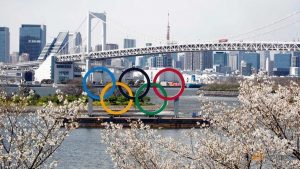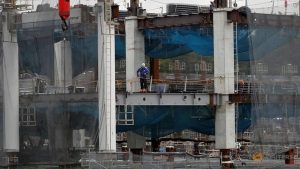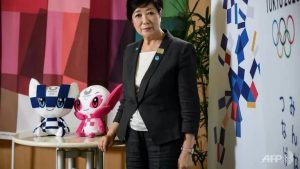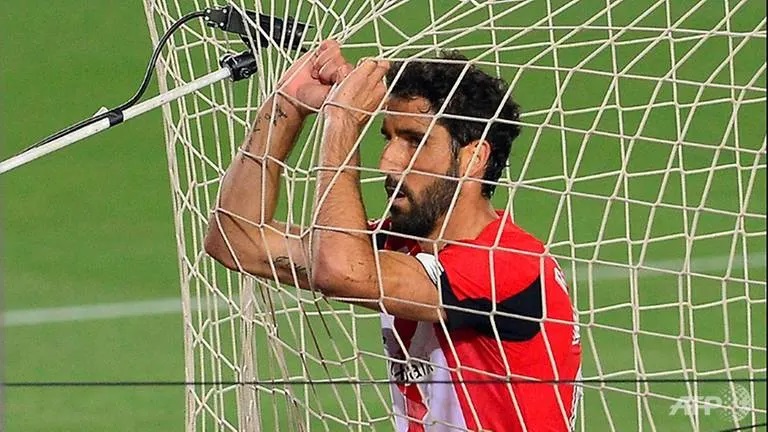If Tokyo can pull off a successful Olympics in 2021 despite the pandemic, it really could go down in history as the “Recovery Olympics”, says an observer.

PHOTO: Reuters/ Yukihito Taguchi-USA TODAY Sports
LONDON: Japan’s path to hosting the Summer Olympics has had more than its fair share of twists and turns.
The Tokyo 1940 Olympics were cancelled. Since their inception in 1896, the Olympics have been cancelled only three times: 1916, 1940 and 1944, all in wartime.
The Games have weathered political boycotts and acts of terrorism, but in 2020 they have been postponed for the first time because of a pandemic.
Tokyo’s first staging of the Olympics in 1964 was historic as the first Summer Olympics in Asia, and served to herald Japan’s arrival back on the post-war international stage as a peaceful and technologically modern nation. Tokyo 1964 would come to be known as the “Happy Olympics”.
Attempts to brand Tokyo 2020 as the “Recovery Olympics” after the 2011 triple disaster received mixed responses. Still, Japan’s strategy to host sport mega-events remains anchored in encouraging investment in “new” sectors such as tourism, travel, sport, education, healthcare and retirement.
If Tokyo can pull off a successful Olympics in 2021 despite the pandemic, it really could go down in history as the “Recovery Olympics”. But this hinges upon Japan’s political decision-making in response to COVID-19 amid global management of the virus.
Japan’s political decision-makers were widely criticised for their slow response to the pandemic and were accused of prioritising hosting Tokyo 2020 over public health. On Mar 24, the postponement of Tokyo 2020 was announced by the International Olympic Committee (IOC) and the Tokyo 2020 Organising Committee.
This occurred amid growing media speculation about the extent of Japan’s resistance to postponement, who could claim credit for the final decision, and to what extent statements from athletes, sports federations and other national Olympic committees had driven the decision.
This speculation highlighted the complexity of the arrangements between multiple stakeholders critical to staging the Olympics. The IOC was primarily guided by information from the World Health Organization (WHO) and the need to coordinate with Japan as the host nation.
After seven years of working with the 2020 hosts across the interplay of national, municipal and sporting institutions to plan the Games, any decision on the future of 2020 had to be made jointly by the IOC and Japan.
UNCERTAIN FUTURE AHEAD
With the world facing over 9.4 million cases of COVID-19 and 480,000 deaths (as of Jun 25), the decision to postpone the Games was apposite.
Still, the implications of the postponement for both the Olympics as an event and the city of Tokyo are uncertain.
The delivery of the 2021 Games is now overseen by an IOC-Tokyo 2020 Joint Steering Committee, each with their own task force: The “Here we go” Task Force on the IOC side and the “New Launch” Task Force on the Tokyo 2020 side.
Tokyo 2020 was expected to host some 11,000 athletes in 339 events across 33 different sports from 206 competing nations.
There was expected to be some 7,000 officials, 25,000 media representatives, 80,000 volunteers and 900,000 daily spectators, with an estimated 10 million visitors expected to travel to Japan.
The Japanese public had already purchased almost 4.5 million of the 7.8 million total tickets. There are 43 domestic sporting venues and hundreds of thousands of travel and accommodation bookings to rearrange.

Men work at the construction site of the New National Stadium, the main stadium of Tokyo 2020 Olympics and Paralympics, in Tokyo, Japan December 22, 2017.
Japanese stakeholders have already spent between US$12.6 billion and US$25.2 billion on Tokyo 2020.
Global broadcast rights for the Olympics total billions of dollars and constitute three-quarters of the IOC’s income. NBC pays US$1.4 billion for the US broadcast alone.
Postponement is estimated to cost an additional US$2.7 billion to US$5.8 billion for Japan, while complete cancellation is estimated at a loss of US$41.5 billion.
Japan’s inbound tourism has increased significantly in recent years. In 2019, visitors to Japan from China alone numbered nine million. The impact of COVID-19 has massive economic implications for Japan beyond Tokyo 2020.
The investment in facilities and infrastructure will likely pay off for Tokyo over time, particularly given current decisions on sustainability and the fact that much of the Tokyo 1964 facilities are still in use.
ALL BOILS DOWN TO COVID-19 MANAGEMENT
The viability of 2021 depends on Japan’s ability to control COVID-19 domestically. The current number of cases and deaths in Japan is comparatively low (about 18,000 cases and 960 deaths), but policymakers must ensure that lingering criticism and any second wave is effectively managed.
The viability of 2021 also hinges on how COVID-19 is managed globally, particularly in nations that are “big hitters” at the Olympics. The United States, Great Britain, Russia, France and Italy were in the top 10 medal-winning nations at Rio 2016.
They also rank high as nations most impacted by coronavirus-related deaths, with the full impact of COVID-19 yet to be determined.
A downsized Olympics without the participation of athletes from major competing countries is likely to be unpopular, but Tokyo Governor Yuriko Koike has announced that the Japanese government and Tokyo 2020 organising committee are contemplating a simplified Games.
If Japan had COVID-19 under control by July 2021, with strict quarantine measures at the border, the Games could run in a viable format, for example, behind closed doors or with reduced spectators.

Tokyo Governor Yuriko Koike said she seek the continued support of Olympics sponsors
Lessons learned from Japan’s hosting of the 2019 Rugby World Cup, including its crisis response to the typhoon that struck during the tournament, are still valuable but possibly less valid amid the new challenges of a global pandemic.
If Tokyo 2020 is downsized or cancelled, the legacy will be how to manage a “new normal” world for the Olympics and other sport mega-events.
Beijing 2022 is scheduled to start five months after Tokyo 2020 ends and Paris 2024 two years thereafter, so lessons from Japan will be paramount.
Helen Macnaughtan is Chair of the Japan Research Centre and Senior Lecturer in International Business and Management at SOAS University of London. This commentary first appeared on East Asia Forum.

